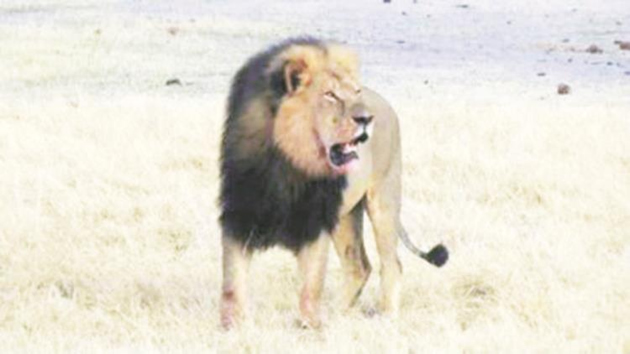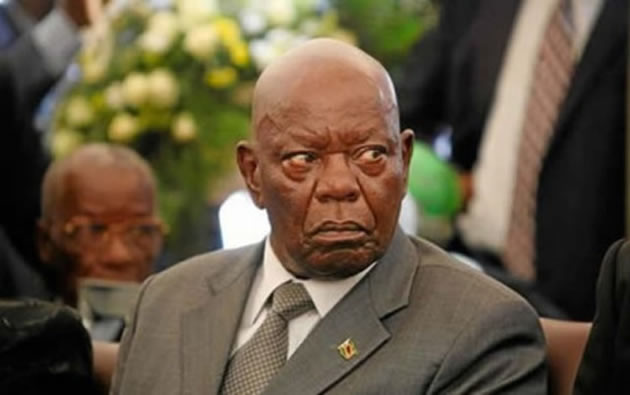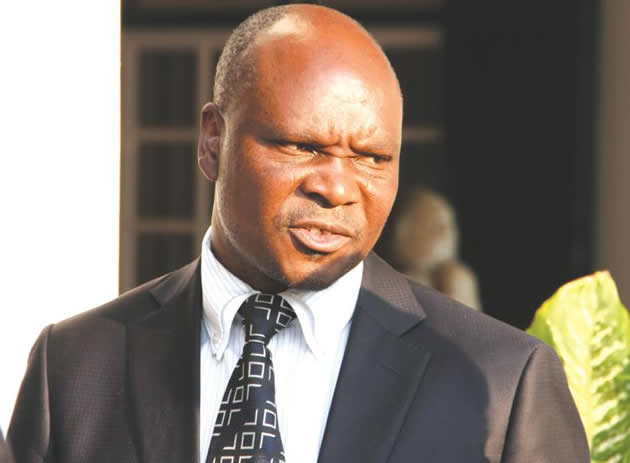Mourning beloved Cecil

Sekai Nzenza On Wednesday
“CECIL is dead,” announced my niece Shamiso. My cousin Piri quickly placed her beer bottle on the table and switched off the blurring noise on television. She sat up and said. “Matii chii? Cecil afa? Nematambudziko.” Piri shook my hand to offer her condolences.
Since Piri is not very familiar with most of my friends living in the Diaspora or those back here in Zimbabwe, she automatically thought Cecil was my friend or someone I know well. I knew that Piri was already picturing a big funeral because she does not like to miss funerals, especially of people with a bit of money because she says, despite the tragic nature of death, there is always plenty of food and beer at such events.
“The whole world is mourning Cecil,” I said, shaking my head.
“And sorry for sure. Cecil is the brother of your friend, the one in America, right?” Piri asked, wanting more details.
Then Shamiso and I burst out laughing. Piri gave us that sympathetic look one gives to a person who is laughing at a misfortune or a problem. But we did not stop laughing, though Cecil’s death was no laughing matter.
“Cecil is a lion, not a person,” I told Piri.
“Ah, Cecil ishumba? I thought he was a person,” Piri said. Then she sucked her breath in annoyance and went back to her original sitting position on the sofa.
She sipped her beer and switched on the television to continue watching a movie about Nigerian witchcraft on Africa Magic.
Then Shamiso grabbed the remote control and switched off the television. Before Piri could protest, I sat next to her to introduce Cecil. I told Piri that Cecil was a beautiful 13-year-old lion who used to live in Hwange National Park with his many cubs. On July 1, Cecil was lured out of safety and shot with a bow and arrow by a visiting American dentist. It took 40 hours for the lion to die.
It was such a tragic event and the whole world was mourning Cecil. Some of our relatives in the Diaspora heard about the news and they were mourning Cecil too.
Shamiso switched on to her phone and showed us the WhatsApp family group communication forum between those in Zimbabwe and the Diaspora. There were 28 messages from family members, discussing Cecil. Someone had written that people should not blame the American dentist, Walter Palmer, because he seriously believed the hunt was legal and trusted his Zimbabwean guides to whom he paid $50 000.
But our new daughter-in-law, Becky, the one who lives in America, posted a photo on Face book of Palmer, dressed in khaki with his arm around a friend standing behind another dead lion. Becky wrote this: “Is this not the most cruel and grotesque way of murdering animals? And these guys call themselves civilised?”
Then our nephew Kuda in the UK, who hardly ever writes anything on the family WhatsApp forum, came in asking why the world was crying over the death of a lion? It was just another animal.
But Becky was not giving up mourning. She posted again another lion called Jericho who was Cecil’s brother and she said on CNN it had been reported that Jericho was also dead. “The Americans are going to kill all our wildlife,” wrote Becky. She added that the population of African lions has been reduced by 50 percent in the past 30 years because white men and poachers come to kill them. It was totally unacceptable that these foreign hunters pay big money to hunt for elephants, leopards and giraffes just for fun.”
“Iwe, stop mourning for one lion like it was a human being. How many lions live in Gonarezhou? How many lions are terrorising villagers along the Zambezi River?” asked Kuda.
“People need something to cry about together, something like a big communal funeral,” wrote another cousin in Canada. “We witnessed something like this when Princess Diana died in the tunnel.”
“Iwe, do not compare the death of our Princess to that of a lion,” wrote Reuben’s wife, Mai Tinashe from Melbourne.
Kuda wrote some more: “If it was me, a black man who shot Cecil, the world would say, I am uncivilised and a savage. All kind of names will be labelled against me. What about a man like Palmer? Ha, varume, what is bad is bad, let us all condemn this white hunter who thinks our safaris are still a playground for corrupt rich Americans.”
Then several other family members wrote to support Kuda, saying when Africans die of poverty and disease, the Western world does not care. But when a lion that is named after Cecil John Rhodes, the greatest colonialist of all time is killed, the whole world mourns, including people in Zimbabwe. What is the world coming to?
Afterwards, as if to calm the tension, Kuda posted funny pictures and videos on the forum. There was one picture with zebras dancing and celebrating the death of Cecil. Then there was another photo of lion cubs walking in two lines with sad faces with a caption saying, “We are going to Cecil’s funeral.”
At that point, a Skype phone call suddenly appeared on the computer that was sitting on the table in front of us. “Its Sekuru Reuben,” said Shamiso, pressing the answer button and pushing the computer in the middle. My cousin Reuben was on Skype, speaking to us from Melbourne, Australia.
“Hello hello hello. Nematambudziko aCecil,” he said, laughing. My condolences about Cecil.
We moved the computer to the bigger table so that all three of us, Shamiso, Philemon (who was visiting his estranged wife Shamiso) and Piri could talk to Reuben.
“Tell me Bhudhi, why is Cecil such big news? One lion dead? Ha?” Piri asked. “Because Cecil, a lion that eats people is dead? They say Cecil arwadzisa. Aive mhuka, aive munhu, aiwa, aive mhuka.” Piri was imitating one cartoon that said Cecil was a person, no he was an animal, no he was a person, no, an animal.
“What about all the zebras killed by Cecil? What about the elands, zebras, baboons, deers and many others killed by Cecil? Cecil is an animal?” asked Piri.
“Because Europeans love wild animals tete,” said Philemon. “But here, we eat every animal that is edible!”
Reuben said the whole world was mourning Cecil. The previous night, Reuben had gone to his local pub in Australia and all news was about Cecil, the lion with a beautiful mane. Those who often talk negatively about Zimbabwe were not doing so last Thursday night.
A big white Australian guy with tattoos on his arms wearing a tight T shirt and short waistcoat had greeted Reuben and said, “Good day mate, I just wanted to say how sorry I am about the death of your beloved Cecil. Just tell your folks back home that we are right behind what your government has decided to do. This rogue American who thinks Africa is still the white man’s playground where men can kill wildlife so mercilessly must be extradited to Zimbabwe and face charges.”
Reuben said the tattooed guy who normally keeps to himself in the bar, hugged Reuben the way men do when they share something sad.
A number of guys in the bar joined in the conversation. A serious looking young white guy with dreadlocks said it was no longer OK for men to shoot lions in Africa. European adventurous hunters might have got away with it in the old colonial days but not anymore.
“That American must bring back the lion’s head and pay for Cecil’s decent burial in Zimbabwe,” said another. “Don’t you agree?” Reuben nodded in agreement.
“And mate, I saw on television that Cecil was under an Oxford University study. Then I saw white men walking and talking to black folks in Zimbabwe. How come those guys look so safe in a mad country like Zimbabwe?” asked the man with tattoos.
Then other people in the bar added that they were surprised to learn that there are white people still living in Zimbabwe. They thought Zimbabwe was a very unsafe place.
Reuben said he then took the opportunity to go on a promote Zimbabwe tourism campaign. He told people in the bar: “The death of Cecil is international news. For the first time in many years, it has shown that Zimbabwe is not the villain that the world has sought to portray.” Reuben invited everyone in the bar to visit Zimbabwe’s game parks and witness how much wildlife still exists.
They can stay at various hotels and visit the magnificent Victoria Falls or spend some time on a house boat in Kariba on the Zambezi River and watch the glorious sunset.
Some guys asked for Reuben’s phone number and email address so they can visit Zimbabwe.
“Sekuru Reuben, I think Cecil was a special rare black-manned lion,” said Philemon. “ He had an Oxford University tag and there were environment people using him to study wildlife.”
“What is a tag?” asked Piri.
“It is like devise that is connected to a satellite and from a computer so you can tell where the lion is. If I put a tag or a GPS on you tete, I track where you are at any time,” said Philemon, smiling.
“This is how they were able to track Cecil to the place where he was killed.”
Piri clapped her hands and said, “Ah, gore rino, ndadzidza zvakawanda!” Meaning this year alone I have learnt a lot.
“How can one animal get so much love by people in America and all over the world? How can people shed tears for an animal who they did not even know existed before it was killed?”
- Dr Sekai Nzenza is a writer and social critic










Comments